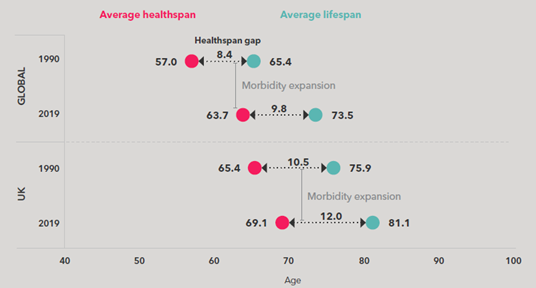Three ways a healthy diet can benefit your client
From good gut-health to boosting immunity and supporting mental health, there are a number of reasons why encouraging your client to eat healthily is a good idea.
More than ever, people are aware of the benefits of a healthy diet – and how it can not only preserve physical health but our mental health too. And help us live longer, healthier lives.According to market research, the pandemic played a big part in bringing attention to the importance of eating better, as a way to safeguard our health from the impact of COVID-19 and other serious conditions. More than half (54%) of consumers globally claim to have spent time educating themselves on ingredients and procedures that could boost their immune health, including sleep, physical activity and nutrition 1.
In our previous article, we explored why a healthy diet should matter to you and your client as it can help prevent lifestyle-related illness and bring down the likelihood they will need to claim. Here are three ways that a healthy diet can be good for them - from boosting immunity to supporting good mental health and potentially improving their healthspan.
1. Boosts immunity
Fibre, found in plant-based foods, is essential for good gut health. Fibre gets broken down by the good bacteria to produce short-chain fatty acids, which have a number of important roles within the body including helping to protect against inflammation.
When it comes to having a healthy gut it’s important to ensure you eat a wide range of different foods. Research suggests that aiming for 30 different plant-based foods each week can help you have a more diverse gut microbiome compared to those who eat less than 10 a week3.
Plant-based foods include...
| Fruit and veg | Legumes | Whole grains | Nuts and seeds | Herbs and spices |
| Includes kiwi, strawberries, apples, tomatoes, mushrooms etc. | Includes beans (e.g., black beans & kidney beans), chickpeas, peas, and lentils. | Includes oats, buckwheat, wheat, brown rice, wholemeal pasta, and quinoa. | This includes almonds, hazelnuts, sunflower seeds, pumpkin seeds, cashews. | The quantities we tend to consume is quite small, so you need to consume 4 different herbs and spices to count as one plant-based food. |
2. Supports good mental health
A recent study 6 looked at the association between regularly eating a diet high in fruits and vegetables and depressive symptoms. It found that regularly eating a small amount (317g) a day of fruit and vegetable was associated with 20% lower risk of experiencing depressive symptoms, compared to those eating just a small amount less (223g per day). There was a similar association between vegetable diversity and depressive symptoms, with higher vegetable diversity (4–6 different vegetables/day) being associated with a 24–42% lower risk of having depressive symptoms, when compared to those who ate less than three different vegetables per day.
More recent analysis 8, looking at individuals who had self-reported depression, showed that improvements in mental health outcomes were significantly correlated with improvements in diet over three months, including greater diversity of vegetables and fruit and intake of legumes. Higher Mediterranean diet scores, vegetables, fruit and nuts and reduced consumption of unhealthy snacks, takeaway food, and meat were also correlated with improvements in mental health outcomes.
3. Helps improve 'healthspan'
Recent Vitality research highlights the impact of these lifestyle choices on our healthspan. Between 1990 and 2019, we’ve seen improvements in our lifespan and healthspan 9. However, the average healthspan has grown at a slower rate than average life expectancy.

Read our report on protective benefits of a healthy diet.
Vitality partners and rewards.
Find out here how your client can get access to a range of rewards and partners to help them lead a healthier life.
Where to next?
-
Five things to say to clients considering cancelling their cover
With most people watching what they are spending right now, it’s important clients don’t make the mistake of cancelling protection and health insurance they might desperately need.
-
Disregarding medical history for mental health is the right thing to do
With the UK facing a growing mental health challenge, ensuring all clients can access support – regardless of their medical history - is more needed now than ever, writes VitalityHealth’s distribution director Athos Rushovich.
-
Insights Hub
Our Insights Hub brings you our range of adviser content - from video series to articles & blogs.
1 Innova, 2020
2 If you want to boost immunity, look to the gut, UCLA Health, March 2021
3 Could you eat 30 plant-based foods a week? World Cancer Research Fund, accessed December 2021
4 Gut-Brain Psychology: Rethinking Psychology From the Microbiota-Gut-Brain-Axis, Front. Integr.Neurosci, September 2018
5 Mediterranean Diet and its Benefits on Health and Mental Health: A Literature Review, NCBI, July 2020
6 Association of habitual intake of fruits and vegetables with depressive symptoms: the AusDiab study. European Journal of Nutrition (2021) 60:3743–3755, https://doi.org/10.1007/s00394-021-02532-0
7 Jacka, F.N., O’Neil, A., Opie, R. et al. A randomised controlled trial of dietary improvement for adults with major depression (the ‘SMILES’ trial). BMC Med 15, 23 (2017). https://doi.org/10.1186/s12916-017-0791-y
8 Natalie Parletta, Dorota Zarnowiecki, Jihyun Cho, Amy Wilson, Svetlana Bogomolova, Anthony Villani, Catherine Itsiopoulos, Theo Niyonsenga, Sarah Blunden, Barbara Meyer, Leonie Segal, Bernhard T. Baune & Kerin O’Dea (2019) A Mediterranean-style dietary intervention supplemented with fish oil improves diet quality and mental health in people with depression: A randomized controlled trial (HELFIMED), Nutritional Neuroscience, 22:7, 474-487, DOI: 10.1080/1028415X.2017.1411320
9 Maximising quality of life: A primer on healthspan and lifespan, Vitality Research Institute, 2021


